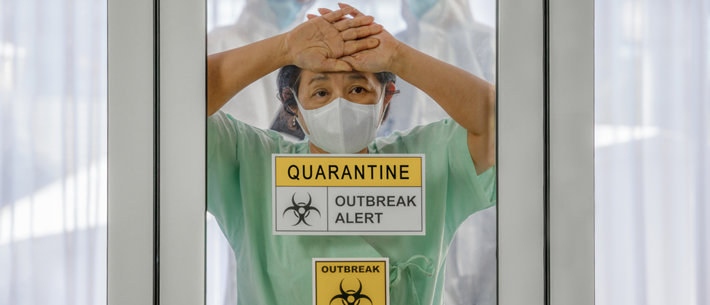
The streets were empty, the office buildings abandoned, schools were closed, shops were shuttered, and people stayed home. In March 2020, fear was plentiful, and there were few places to seek comfort.
Houses of worship closed their doors, and clergy took crash courses in delivering their weekly message of encouragement via Zoom or social media. Their flocks became comfortable taking part in flannel pajamas while munching on cereal and sipping coffee from their favorite mug instead of paper cups in the vestibule after service.
Everyone eventually adapted—except those confined to nursing facilities and hospitals.
Feelings of fear and anxiety often accompany serious illness. Add to that a global pandemic, the forced absence of loved ones at the bedside, and the real threat of a deadly contagious virus, and those unsettling emotions proved overwhelming for many. Patients weren’t the only ones feeling the wrath of Covid-19. Essential healthcare workers donned their scrubs and masks and made it to the hallways of hospitals around the world—stoic as they fought the knots in their own stomachs at the thought of becoming ill, and overcome with fatigue and sadness from reduced staff, extended shifts, and the often-daily loss of patients. It was apparent that someone to offer comfort was needed now more than ever.
Enter the spiritual care provider—better known as a chaplain.
They had to think outside their traditional role of handholding, bedside prayer, warm hugs, and words to encourage strength and healing. They took to standing outside windows with a smartphone in hand, placing calls to bed 1 or bed 2. The smartphone enabled the conversations, and the windows delivered the smiles. They resorted to iPads that allowed them to deliver eulogies at Zoom funerals and provide solace to those left behind.
Between their duties to patients and families, they offered brief hallway prayers from a six-foot distance to burnt-out healthcare workers, double-masked and draped in plastic as they made their way to their next patient.
While chaplains are known for being available to soldiers in times of war, offering spiritual care and a sturdy shoulder, this warzone proved just as challenging.
In time, restrictions relaxed, vaccines circulated, and contracting Covid-19 was considered more of an inconvenience than a potential death sentence. People returned to work, students returned to the classroom, and places of worship opened their doors for spiritual gatherings. Hospital and nursing center hallways were once again filled with loved ones eager to visit the bedridden and recovering, and in-person doctor visits were reinstated, allowing patients to feel more secure in their healthcare.
The dark days of uncertainty ended, and thanks to the light of the chaplain, the spirit of so many remained alive and well.
_______________
From its beginnings, the Church of Scientology has recognized that freedom of religion is a fundamental human right. In a world where conflicts are often traceable to intolerance of others’ religious beliefs and practices, the Church has, for more than 50 years, made the preservation of religious liberty an overriding concern.
The Church publishes this blog to help create a better understanding of the freedom of religion and belief and provide news on religious freedom and issues affecting this freedom around the world.
The Founder of the Scientology religion is L. Ron Hubbard and Mr. David Miscavige is the religion’s ecclesiastical leader.
For more information visit the Scientology website or Scientology Network.
DOWNLOAD THE WHITEPAPER

